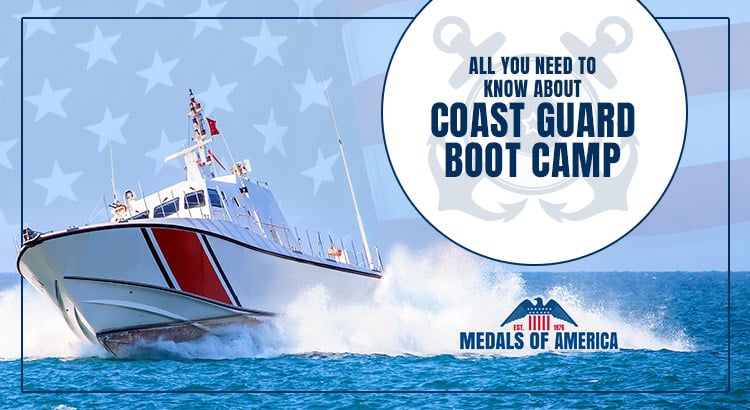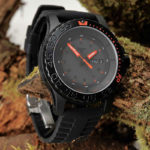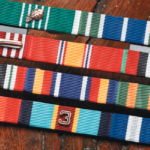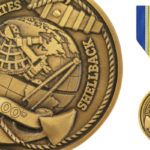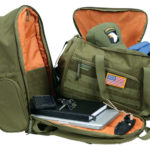If you or a family member has enlisted in the Coast Guard, they have volunteered for a unique and special privilege in service to our country. The Coast Guard ensures that our maritime activities remain legal and safe, and they brave the elements to save people in rescue missions. Members of the Coast Guard are also deployed to protect maritime assets overseas, and to supplement the Navy during times of war.
Because of their many physical responsibilities and duties, members of the Coast Guard must first pass a rigorous basic training program called “boot camp,” much like the other branches of the U.S. military. Boot camp is slightly different for each branch of the military, so the Coast Guard has its own unique locations, physical requirements and academic training.
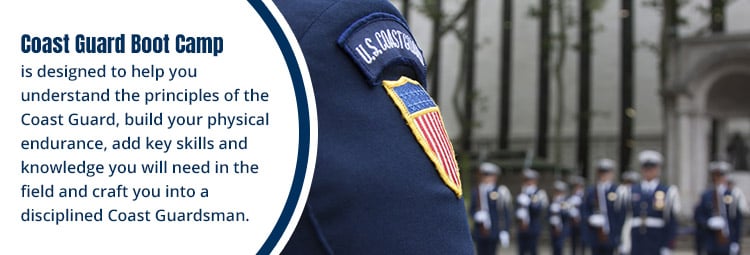
The Coast Guard’s boot camp is located in Cape May, New Jersey, and it lasts for 53 days or 8 weeks. The training is designed to help you understand the principles of the Coast Guard, build your physical endurance, add key skills and knowledge you will need in the field and craft you into a disciplined Coast Guardsman. This process can be arduous and challenging, and you may have a lot of questions as to what it will be like.
While your recruiting officer can fill you in on a lot of the details and answer many of your questions, sometimes it is helpful to also get a quick, basic rundown for what to expect. The following is a comprehensive guide for all you need to know when you arrive at Coast Guard boot camp.
What you can and cannot bring
This is a general listing of what recruits can and cannot bring with them into basic training. If items are not allowed, they will be confiscated and returned upon graduation from the program. Women, of course, have different needs and questions about what to expect upon their arrival at boot camp. Important questions such as access to feminine hygiene products, birth control, makeup, bras and other items can all be answered in this Coast Guard basic training brochure.
Recruits cannot bring in over-the-counter medications. If you have prescription medications, they will be confiscated and a military doctor will evaluate you. Women are encouraged to bring three months’ worth of their birth control pills, but they will also still be evaluated by a military doctor. Any illegal drugs or narcotics will be confiscated and may disqualify you immediately.
Some of the items men and women may bring include:
- 6-10 pairs of underwear
- A conservative-style watch
- 3 white V-neck shirts
- Toothbrush/toothpaste and Invisalign®
- Non-electric razor
- A Bible, address book, stationery and stamps
- A cell phone and charger, but you will only be able to use this on the Sundays of weeks 6 and 7
- Unframed pictures
Women may bring:
- Neutral-colored hair ties
- Feminine products
- 6 sports bras and 1 regular bra
- Shampoo/conditioner
The Coast Guard has a full list of items you can bring with you upon your arrival at boot camp.
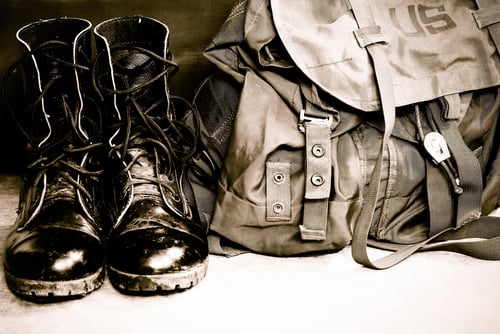
You should have your items in a regular-sized carry-on duffel bag or suitcase with your name clearly printed or affixed to it. You must have a government-issued ID card and your Social Security card. The Coast Guard recommends bringing $50 in cash to purchase items at the Exchange. You should also set up a bank account with an ATM card ahead of time because your basic training pay will be automatically deposited into your account.
What you will be given
There will be personal items issued to you immediately. Any items you still need, or you forgot to bring, can be purchased at the Exchange. Some of the items you will be issued include:
- Floss
- Shower kit, soap, deodorant, shampoo, shaving cream
- Towels and washcloth
- Shower shoes
- Laundry bags, and a delicates bag for women
- Notebook and pens
- Running shoes and socks
- A rucksack
- 2 athletic supporters for men
- A sewing kit
- Uniforms
- Sunscreen and insect repellent, depending on the time of year
Staying in touch with family and friends
When you arrive at Cape May, your family will receive a postcard with your information such as your mailing address. They may send you letters, but you cannot receive packages such as care packages. You will not be permitted to receive personal phone calls unless there is a family emergency. Phone privileges in later weeks are granted by your Commander at their discretion only.
What you should know
The more required knowledge you have already learned ahead of boot camp, the easier your transition into training will be. First, since it is the Coast Guard, you should know how to swim. If you don’t know how to swim, you will be placed into specialized training to help you get up-to-speed.
You should know the basic customs and courtesies, from salutes, to vessel terminology, to the position of attention. You should also learn and understand the ranks of the Coast Guard, uniform styles and occasions and how to address other personnel, especially your superiors. You’ll even need to learn how to describe the Coast Guard emblem and the insignia of the different ranks on uniforms.
There’s a lot to learn, so starting early can help with your learning curve and give you time to focus on other things.
Basic training physical requirements
The first point for improved physical endurance and shape the Coast Guard will recommend is if you’re a smoker, stop. Ideally, you need to stop smoking several weeks or months before beginning training. Not only will smoking impact your lung capacity during exercise, but withdrawal symptoms will not be a pleasant experience on top of all the other stresses of boot camp.
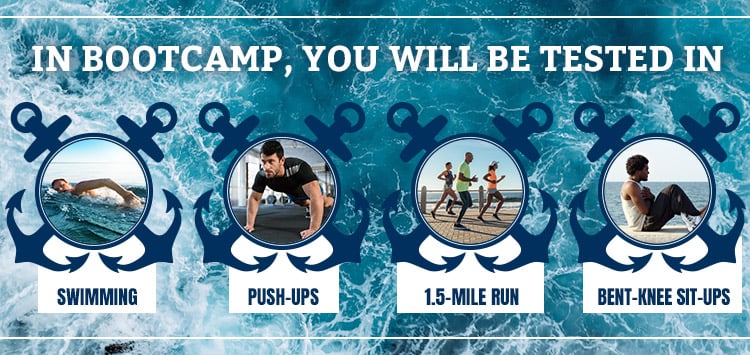
By the end of your time in basic training, there are four categories of physical performance you will be tested in: Swimming, Push-ups, 1.5-Mile Run and Bent-Knee Sit-ups. There are different qualifications for males and females, and you must meet the required forms as you perform these tasks.
If you can show up to basic training already being able to meet these basic requirements, it won’t be such a shock to your body. Additionally, being able to do more than the bare minimum to meet your graduation requirements will show initiative to your commanding officers, which can be a huge benefit. Any time you can find yourself able to prepare, take the opportunity to do so because it can help keep your stress levels down and minimize mistakes.
The Schedule
The training camp is broken up into eight weeks, but it can last up to 12 weeks if you don’t pass certain tests or exams or if you are not disciplined. Graduations take place each Friday, and your goal is to graduate on the same Friday as everyone else in your cohort. This is what to expect.

Week #1: Arrival and settling in
During your arrival and first few days, you will be in-processed. This means you will be issued all your personal items, take a urinalysis test, fill out paperwork, get shots and receive your uniforms. Additionally, you will be issued a copy of The Helmsman, which contains all your required knowledge and Coast Guard processes. You will be required to study The Helmsman and expected to be reading it during downtime.
If you need to meet with the medical doctor to evaluate medical needs and medications, you will do this within the first few days. You will be placed into a company and assigned a Company Commander. Your day begins at 5:30 a.m. and ends at 10 p.m. Each day will be filled with physical regimens and classes about the military, including the Uniform Code of Military Justice, and everything you need to know about the Coast Guard and functioning as a member of the U.S. military.

Week #2: Classroom time and physical training
You will spend a lot of time in classes over these weeks learning about the military, the GI Bill and the basics of seamanship. You will continue to train in physical exercises each day and follow a strict schedule with your company. You and your company will grow together as a team, and you will learn to work together as one unit.

Week #3: More classroom time and gun training
Your third week focuses on continued classroom training and military information classes. What makes week #3 more interesting is that this is when you are introduced to the 9mm handgun, which you will begin training to shoot in week #4. You will also begin preparing for midterms.

Week #4: Mid-terms, PT and marksmanship
During week #4, things begin to heat up, and a lot of moving parts begin to fall into place. First, you must pass your mid-term exams and first PT test. If you do not pass your first PT test, you will have to go to special training to try again by week #7. If you don’t pass by week #7, you may be held in boot camp for up to 12 weeks.
Your midterms help determine where you are going to be assigned. When you pass your midterms, you can put in your request for a geographical location and operations assignments, which the Coast Guard will attempt to fulfill as best as they can. Meanwhile, you will spend time firing a 9mm handgun and perfecting your marksmanship at the range.

Week #5: Assignments and continuing education
In week #5, you will receive your assignment and contact your new post to begin preparing for your move there after graduation. You’ll receive in-depth, hands-on training of lines, knots, seamanship, fire prevention, deck maintenance and other aspects of deployment on vessels. You’ll begin learning about your military entitlements in preparation for your first assignment after graduation.

Week #6: Fire
Week #6 is all about fire: Fire prevention, watch standing, firefighting and everything else to do with putting out a fire, especially on a vessel. You will also receive some career counseling to help prepare you for post-graduation plans and paths.

Week #7: Final exams and PT
This is the big week. You must pass your final exams and, for those who did not pass their first PT test, you must pass the final PT test. If you do not pass your exams or PT, you get one chance to re-do them. If you fail again, you will be reverted, or held back with another company for up to 12 weeks in basic training.

Week #8: Graduation
The final week is the culmination of all of your hard work and studying. You will learn first aid and CPR to begin to prepare for your next post. Graduation takes place at 11 a.m., and Coast Guard ribbons are given out at the ceremony for awards in academic achievement, seamanship, academic achievements, leadership and other areas of training. You will finalize your paperwork for your assigned ship or unit and move on to the next step of your Coast Guard journey.
After boot camp
Boot camp will provide you with the guidance, physical training and mental training you need to begin conducting yourself as an official member of the U.S. Armed Forces. Immediately after graduation, you will leave Cape May and have five days of leave to be with your family and friends. You will then be recalled and report directly to your first assignment.
Assignments in the Coast Guard are filled with priority given to operational duties. Operations Ashore officers take care of vessel inspections, port safety, marine safety and waterways operations and management.
Operations Afloat officers are assigned to Coast Guard cutters, which patrol the waters and perform special operations at sea. After an apprenticeship of at least 36 months, you can work your way up into specialist positions aboard the cutter.
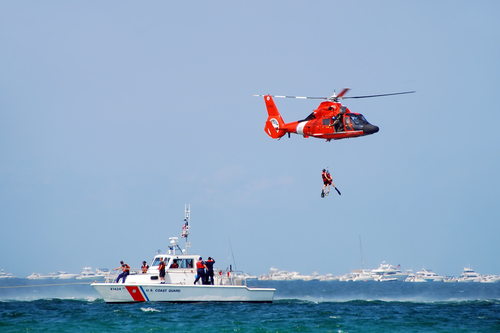
If you are taking a particular career path, including such specialties as Electrician’s Mate, Boatswain’s Mate, Damage Controlman, Operations Specialist, Maritime Enforcement Specialist, etc., you will receive training in these areas at your assigned duty post. With lots of hard work and effort, you can progress through your career track and be promoted to new assignments or responsibilities.
Either through on-job training or “A” school program at the USCG Aviation Technical Training Center, you can advance through the ranks and earn greater pay and responsibilities. If you choose to not re-enlist in the Coast Guard after your active duty enlistment, you will likely want to take advantage of the GI Bill. The Post-9/11 GI Bill offers former enlisted members of the military up to 36 months of education and schooling benefits for 15 years after they leave enlisted service. This is a huge financial and educational opportunity and can launch your post-military career in the right direction.
Final thoughts
The Coast Guard is the smallest arm of the military, but it is also one of our most important. From defending our shores at home to protecting our assets abroad, you will likely find your career with the Coast Guard to be a rewarding and educational experience.
